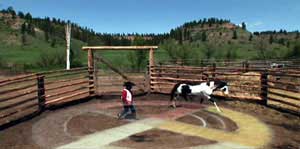Become a QPR Gatekeeper!

QPR stands for Question, Persuade, Refer, and it refers to a training program to help deal with someone with suicidal thoughts. Door County Public Health Nurse Sue Powers says it’s a program that more people in our community should be trained in, since Door County has a higher suicide rate than the rest of the state. Just like CPR, QPR is an emergency response to someone in crisis and can save lives. QPR is the most widely taught gatekeeper training program in the United States, and more than one million adults have been trained in classroom settings in more than 48 states.
“It’s a system for laypeople talking to someone who’s upset,” Powers says. “It trains people how to deal with someone who might be suicidal and to avoid, ‘Oh my god, I don’t know what to do’ or ‘I shouldn’t talk about this because it will put ideas in their head,’ which is totally untrue. The hour-long training gives people information on how to persuade someone that there is hope and how to refer them to resources.”
In honor of Mental Health Month, two free QPR training sessions will be held in Door County this month. This first is tonight from 6 to 7 pm at the Sister Bay/Liberty Grove Library. Door County Library Director Becca Berger will be the trainer.
The second session will be held from 6:30 to 7:30 pm on Thursday, May 22, at the Sturgeon Bay Library. Debi Traeder, a master trainer from Wausau, will lead that session.
The QPR Institute also provides the QPR suicide prevention gatekeeper training program online.
QPR Online is taught in a clear, concise format using the latest in educational technology and takes approximately one hour to complete. More time may be taken to read additional files, practice the intervention and review key information for high risk groups; elders, youth, medical patients and others. A high-speed internet connection is required.
QPR Online is hosted by actress and author, Carrie Fisher, and uses web-based technology, compelling graphics, video and interactive learning dynamics to teach:
- How to get help for yourself or learn more about preventing suicide
- The common causes of suicidal behavior
- The warning signs of suicide
- How to Question, Persuade and Refer someone who may be suicidal
- How to get help for someone in crisis
After completing a post-course survey, evaluation and passing a 15-item quiz on QPR, a printable Certificate of Course Completion is available. To reinforce online QPR gatekeeper training, all self-paced learners receive an enriched program review (an e-version of the QPR booklet and option to print a wallet card) immediately after completing training.
Upon completion of training, learners also receive courtesy email reminders to review and recap their training experience at six weeks, at 46 weeks, and just before their training license closes at the end of 3 years.
Of note, research has shown QPR Online to be equally effective to classroom QPR training, and in some areas, e.g., retained knowledge and self-efficacy, significantly more effective. Online training advantages include learner control of training, reduced delivery and administrative costs, and confidentiality to reach out for help, e.g., seek a personal depression screening or call a crisis line (embedded in the online option).
Please, see the May 9 edition of the Peninsula Pulse for more information on suicide prevention efforts in Door County.





